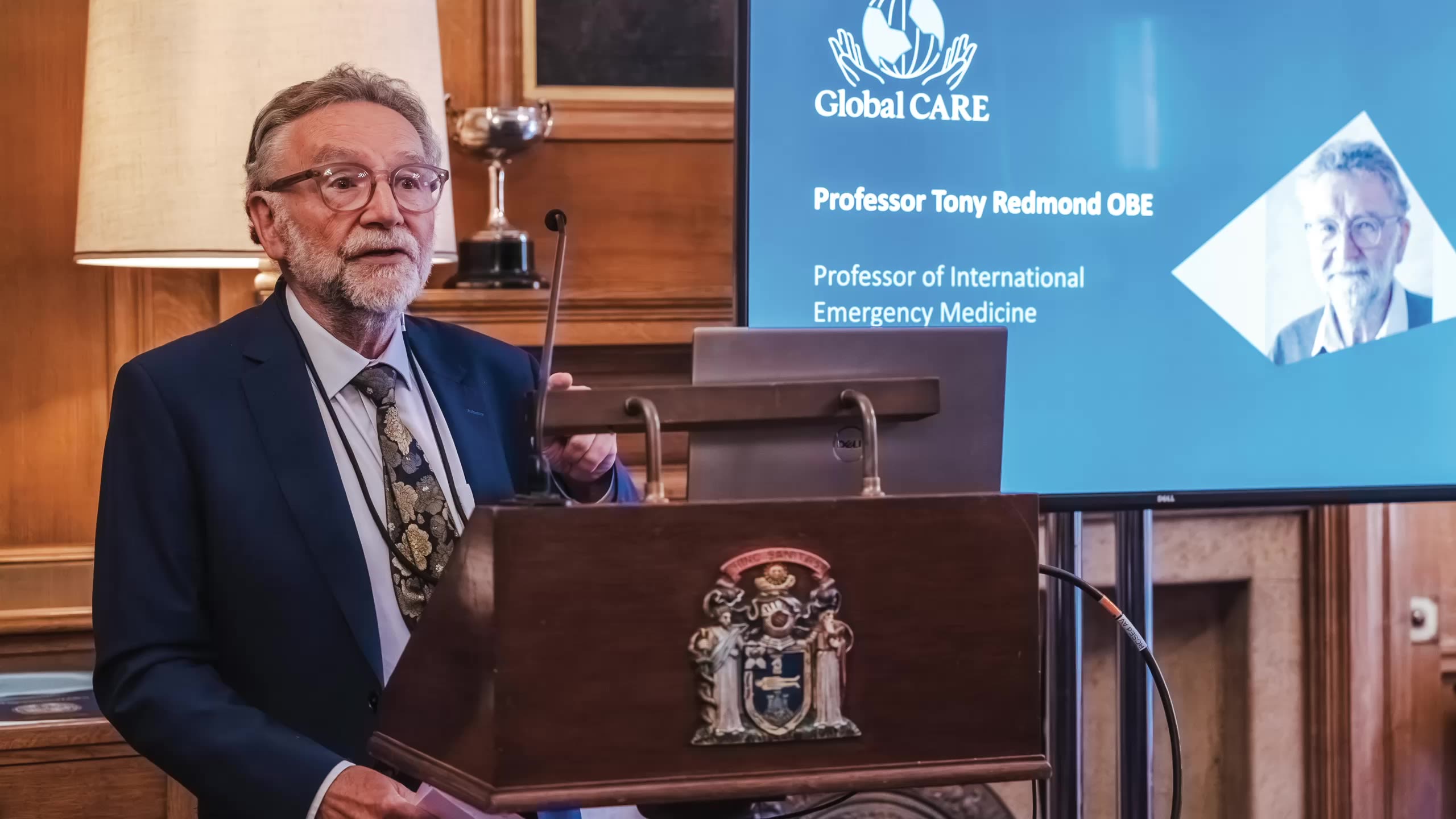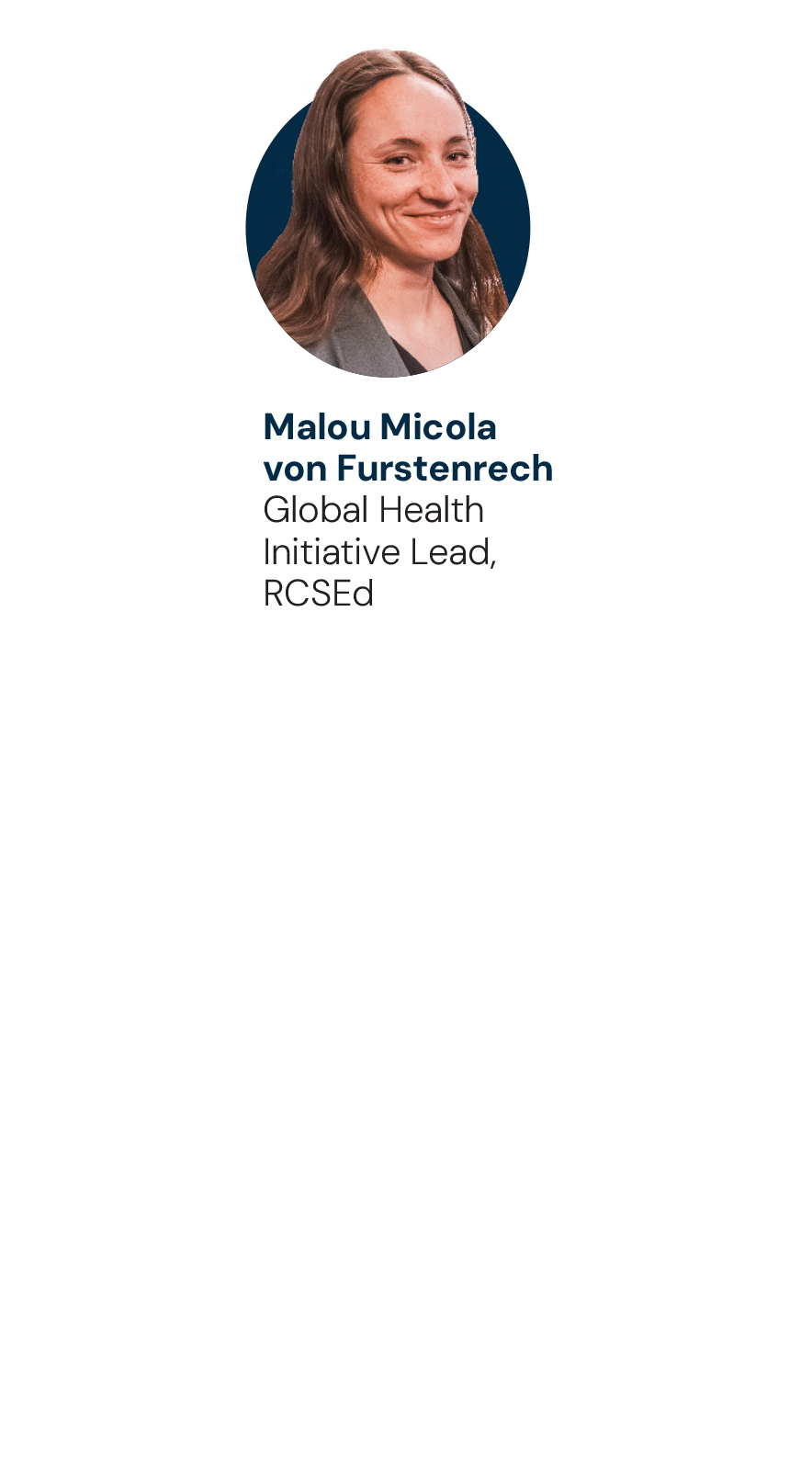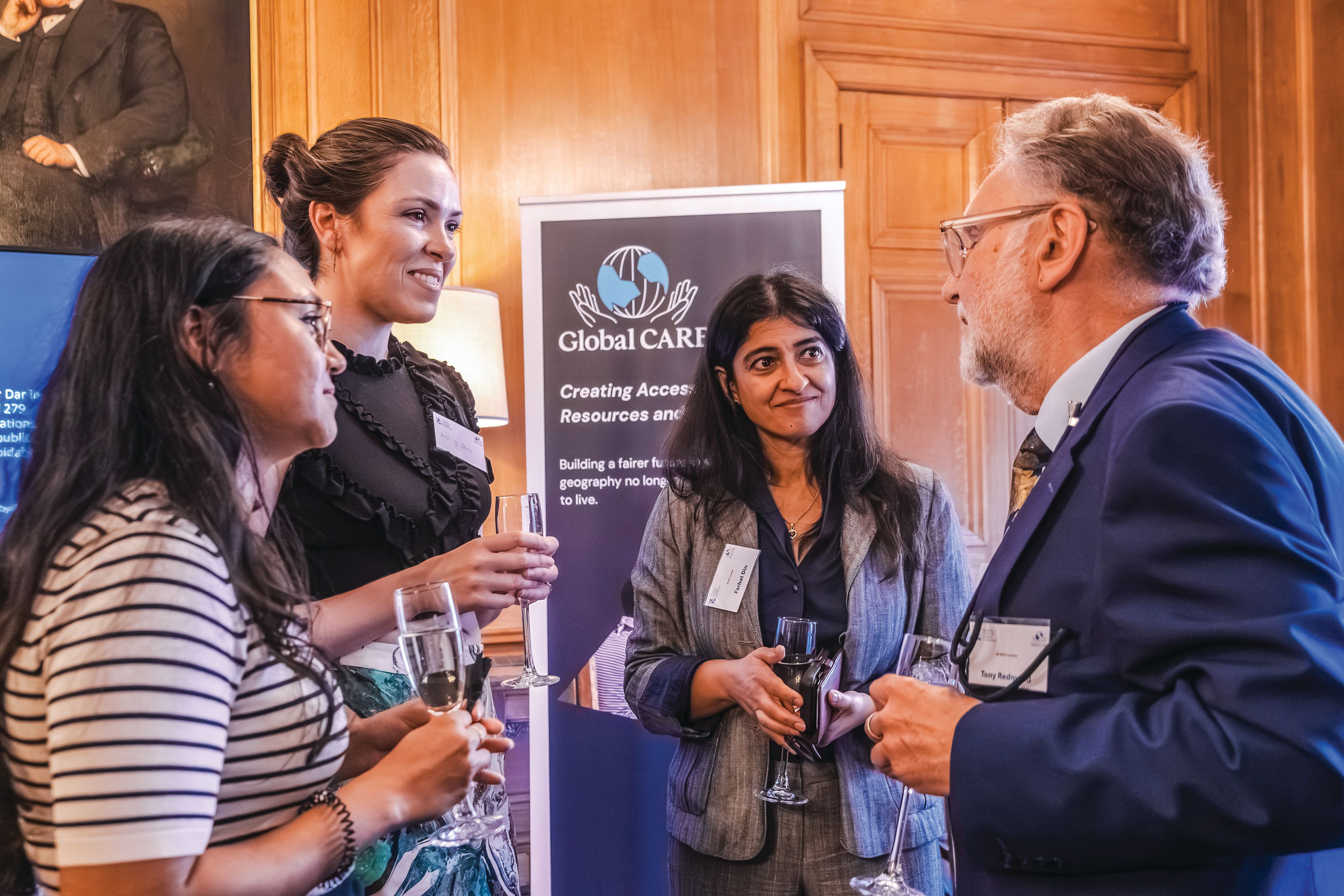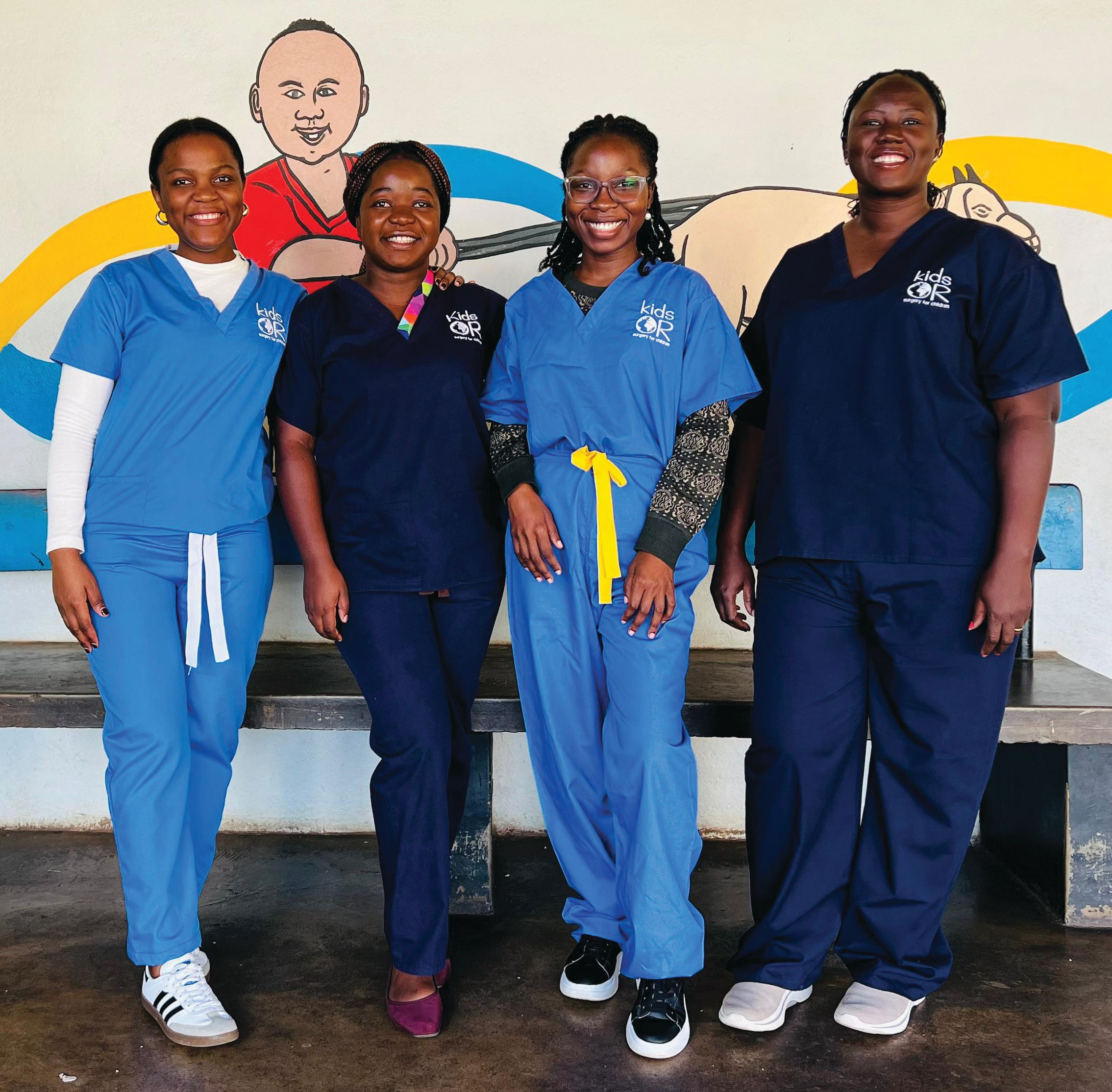Surgery saves lives, access changes everything
The College takes essential action on health inequalities through Global CARE initiative

When geography determines whether or not you live, change is not just needed – it’s urgent. In a world where someone with a survivable injury is six times more likely to die simply because of where they were born, the Royal College of Surgeons of Edinburgh has taken a bold stand. On Thursday 26 June, the College officially launched Global CARE – Creating Access to Resources and Education. This new initiative signals the College’s unwavering dedication to dismantling healthcare inequities worldwide. The launch brought together a powerful coalition of Members, Fellows, generous donors and committed partners, all united by a shared belief that quality healthcare should never be determined by where you were born.
In his opening speech, RCSEd President Professor Rowan Parks outlined how Global CARE stands on three foundational pillars. The first pillar centres on Global CARE Grants, which fund initiatives aimed at improving access to surgical and dental care in underserved communities. Rather than providing temporary fixes, these grants focus on building sustainable local capacity through education, training and infrastructure development.
The programme offers two funding tiers. Small grants provide up to £3,000 for focused, short-term projects or pilot initiatives, covering training workshops or educational resources that deliver immediate impact. Large grants offer up to £10,000 for comprehensive, longer-term projects spanning up to three years, supporting multi-faceted initiatives combining training, infrastructure development, and capacity building.
The second pillar tackles professional development through Global CARE Scholarships, providing access to essential surgical and dental skills training unavailable in recipients’ home regions. Funding of up to £25,000 is available, designed to equip them with skills to serve as a catalyst for transformation within their own healthcare system.
Attendees network at the Global CARE launch event
Attendees network at the Global CARE launch event
The third pillar represents Global CARE’s most ambitious commitment to sustainable change through strategic partnerships and College-led initiatives. By collaborating with aligned organisations, the College
can direct resources where they are needed most, creating programmes that address specific regional challenges whilst building essential local expertise.
The vital need for this approach was reinforced powerfully by the evening’s keynote speaker, Professor Tony Redmond OBE, who drew from his extensive humanitarian experience to highlight the critical need for ethical, accountable, international medical intervention.
Professor Redmond’s address centred on lessons learned from poorly coordinated aid efforts, particularly his experiences during the Haiti earthquake response. He described witnessing medical teams performing amputations at rates approaching 85%, often without proper consent or documentation, practices he condemned as “disaster tourism and a medical shame”. These examples served as a stark reminder of why Global CARE’s partnership-based approach is essential for ensuring that good intentions translate into meaningful, sustainable impact.
The keynote emphasised that real healthcare improvement must move beyond creating dependency and instead build genuine collaborative relationships that develop lasting local medical capacity. Professor Redmond’s conclusion that “there is no healthcare without global healthcare” reinforced our collective responsibility to address global healthcare disparities.
Following this, Professor Angus Watson, the interim chair of Global CARE, announced the first recipients of the awards, who were selected by a panel bringing together diverse perspectives and knowledge.
The panel included Mohammad Riaz, a consultant general surgeon with 30+ years of experience managing military and civilian disasters across Asia, Africa, Latin America, the Middle East and Far East; Ann Sunny, consultant general surgeon at Royal Lancaster Infirmary, with surgical expertise in simulation and global health education across Scotland, England and India; Dr Aravinda Guntupalli, senior lecturer in global health at the University of Aberdeen, specialising in health inequalities research spanning India, the UK, Kenya and Zimbabwe; and Eimear Monaghan, consultant general and colorectal surgeon with a diploma in the medical care of catastrophe, currently working in Belford Hospital, Fort William.
The 2025 inaugural Global CARE recipients demonstrate the breadth and ambition of Global CARE’s mission, spanning six countries and six medical specialties. Three large grants of £10,000 each were awarded: Rachael Collins and Dr Kenneth Mlay will improve ENT care access in rural Tanzania through airway training partnerships; Dr Becky Sandford, Mustafa Musajee and Professor Paul Odula will train non-specialist surgeons in Kenya to recognise diabetes-related limb conditions; and Jayanth Kesave, generously funded by the Sir Henry Wade’s Pilmuir Trust, will establish a comprehensive nutrition care programme in Nepal to benefit 300 paediatric surgical patients.
Two small grants were also awarded: Dr Meron Mulat Gebrehiwot and Dr Ashenafi Yitbarek received £3,000 to improve pre-hospital burn care in Ethiopia, representing crucial post-war healthcare foundation building in Mekelle; whilst Haleemah Abdul-Razakq secured £3,100 for innovative salivary biomarker research in Thailand, potentially transforming oral cancer detection by replacing invasive biopsies with simple saliva tests.
The scholarship recipient, Dr Kuburat Oluwatoyin Monisola Adenrele, received £5,120 for cataract surgery training at Aravind Eye Hospital in India, with plans to return to Nigeria (where blindness affects over 40% of people over the age of 40).
The Global CARE initiative was created following the Global Surgery Foundation, which was launched in 2015 and previously invested over £117,000 in projects and professionals across Malawi, Rwanda, Ethiopia, Nepal, and beyond.
One such success story is that of Dr Betty Arkangelo Yuggu Philimona, whose journey exemplifies the transformative power of strategic investment in local talent. The Royal College of Surgeons of Edinburgh provided Dr Arkangelo with £6,500 in funding for the first year of her five-year training to become a paediatric surgeon.
Dr Arkangelo is from South Sudan – a country of more than 11 million people that currently has no paediatric surgeons. In a nation where one in every 11 children dies before their fifth birthday, mostly from treatable or preventable conditions, the absence of access to safe surgical care is a silent crisis.
Dr Betty Arkangelo (far right) with colleagues during training in Malawi
Dr Betty Arkangelo (far right) with colleagues during training in Malawi
With additional support from the Royal College of Physicians and Surgeons of Glasgow, and the remainder funded by Kids Operating Room, Dr Arkangelo is now in her final year of training. Upon completion, she will return to work at Al Saba Children’s Hospital in Juba, South Sudan, as one of the country’s first paediatric surgeons. She will be able to perform life-saving procedures that were previously impossible, transforming outcomes for children who would have faced preventable disability or death.
As we look ahead, the urgent need for Global CARE’s mission cannot be overstated. The statistics paint a sobering picture: 5 billion people still lack access to safe surgery, 4.7 million people die each year from treatable surgical conditions, 9 out of 10 people in low- and middle-income countries are denied basic surgical services, and just 12% of specialist surgeons serve 35% of the global population. These numbers represent not just statistics, but lives that could be saved.
Global CARE’s awards will open for applications again at the end of this year, with new 2026 recipients expected to continue making a transformative difference in low- and middle-income countries. However, to expand our reach and impact even further, we need the support of generous donors and partners who share our vision of a world where quality healthcare is a universal right, not a privilege.
If you are interested in joining this vital mission, whether as a partner organisation or supporter, we encourage you to get in touch with Gemma Elliott at G.Elliott@rcsed.ac.uk. Together, we can create a future where surgical expertise reaches every corner of the world.
Read more




